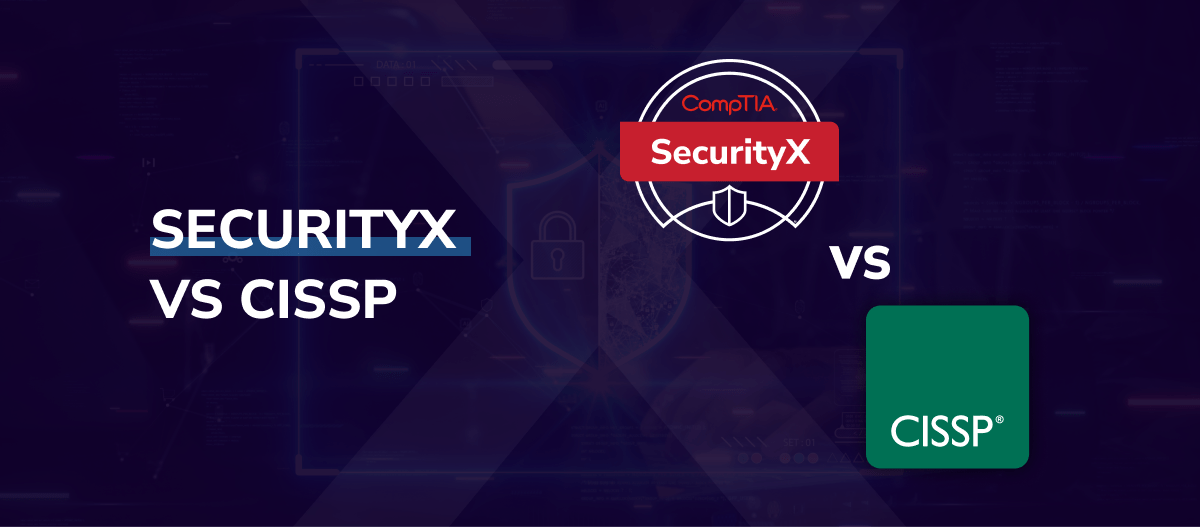If you’re looking at advanced cyber security certifications, you’ve probably heard of the CompTIA SecurityX (formerly CASP+) and ISC2’s Certified Information Systems Security Professional (CISSP) certification exams, both of which are ISO 17024-compliant certifications recognized for cyber security career advancement.
While they are designed for somewhat different audiences, both market themselves to mid-career professionals hoping to advance in cyber security roles. Additionally, they share several foundational knowledge areas relevant to cyber security, particularly in Governance, Risk, and Compliance (GRC).
When considering SecurityX vs CISSP, which one aligns better with your goals and career progression? Understanding how they differ and which one helps you progress further in your career is important when planning your long-term goals, so let’s break them down and find out which one’s better for you.
What are SecurityX and CISSP Certifications?
The CompTIA SecurityX (formerly CASP+) certification is an advanced-level credential that focuses on the technical skills required for enterprise security. SecurityX focuses on advanced technical skills, whereas the CISSP emphasizes a broader managerial perspective on information security practices.
While both certifications cover overlapping content areas, their main emphasis differs: SecurityX leans toward the technical, while CISSP is managerial. Despite their vendor-neutral nature, SecurityX and CISSP can lead to distinct career paths for those pursuing these certifications.
Let’s explore these differences and how they contribute to the unique strengths of each certification.
About SecurityX
The rebranded successor to CASP+ (CompTIA Advanced Security Practitioner), SecurityX is an advanced-level cyber security certification for security architects and senior security engineers to validate their skills in areas such as risk management, enterprise security operations, and the integration of enterprise security.

Launched in December 2024 as part of the Xpert series of CompTIA advanced certifications, SecurityX focuses on the practical, technical application of security solutions within defined policies and frameworks, distinguishing it from CASP+’s greater emphasis on managerial responsibilities, such as leading and improving an enterprise’s security posture.
The new exam verifies candidates’ abilities to architect and implement secure solutions in cloud, on-premises, and hybrid environments, understand cryptography and emerging trends such as artificial intelligence, and support a resilient enterprise while addressing governance, risk, and compliance needs.
Unlike CASP+, the learning objectives of SecurityX place less emphasis on managerial aspects of security solutions from the advanced cyber security technical knowledge presented therein.
About CISSP
The Certified Information Systems Security Professional (CISSP) advertises itself as “the most globally recognized certification in the information security market.” We deem it a fair claim, supported by the ubiquity of cyber security job postings mentioning CISSP worldwide.

The CISSP certification validates proficiency in safeguarding organizations from various cyber threats. It certifies an information security professional’s comprehensive technical and managerial knowledge and expertise in successfully designing, engineering, and managing an organization’s comprehensive security posture.
CISSP blends technical expertise with governance, risk, and management skills. It demonstrates your understanding of risk management, compliance, and regulatory agreements, as well as legal issues, business continuity, reporting, designing and auditing security strategies, and many other skills not typically considered “technical.”
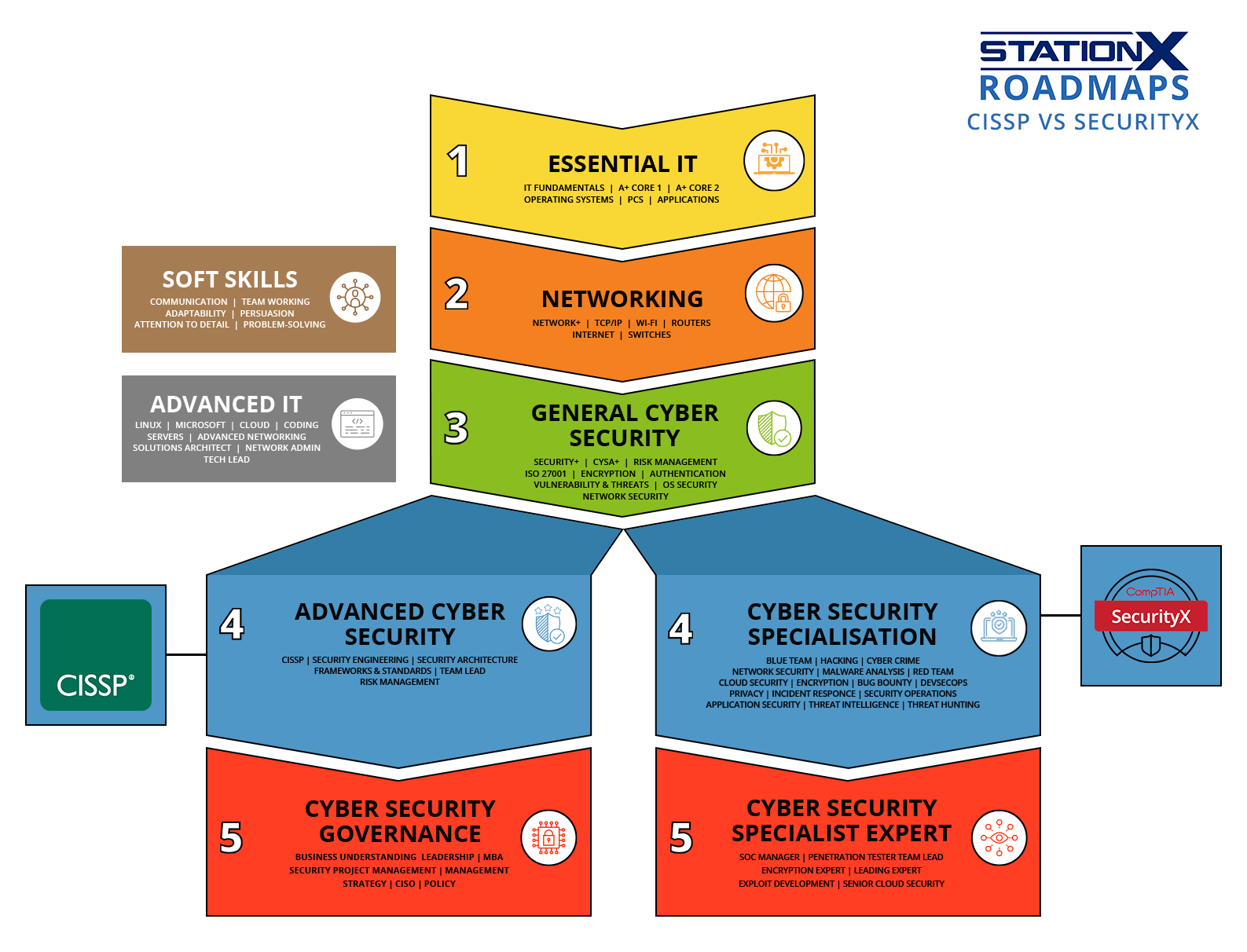
Exam Details
Both certifications cover extensive knowledge areas with some overlap, but they differ significantly in focus and exam format.
SecurityX Exam Details
As the successor to the CASP+ exam, the SecurityX exam code is CAS-005. You have 165 minutes to complete the exam, which will consist of no more than 90 questions. Like most other CompTIA exams, SecurityX consists of both multiple-choice and performance-based questions (PBQs).
Unlike its foundational CompTIA certifications such as Security+ and PenTest+, SecurityX is a pass-or-fail exam without any scaled score. You won’t know if your performance was great or mediocre in any SecurityX exam domain.
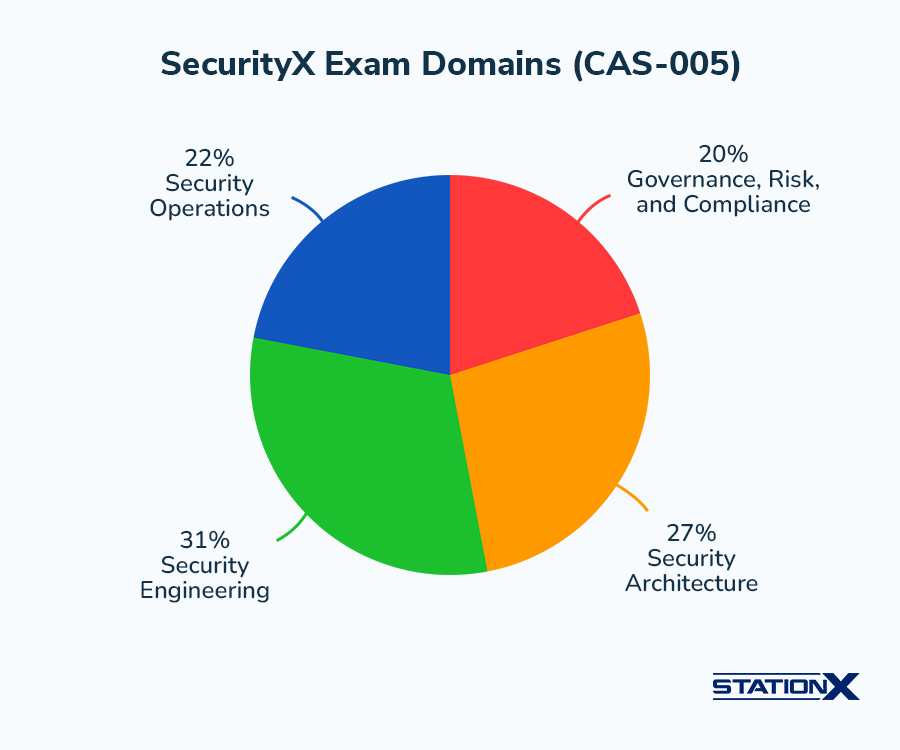
Here are the SecurityX exam domains:
| Domains | % of exam |
| Governance, Risk, and Compliance | 20% |
| Security Architecture | 27% |
| Security Engineering | 31% |
| Security Operations | 22% |
A significant factor contributing to the recognition of CompTIA certifications is their use of performance-based questions (PBQs). PBQs assess your hands-on lab skills in engineering and troubleshooting security solutions. Excelling at such assignments demonstrates your competency.
The PBQs on the SecurityX exam deserve significant attention as they’re quite different from the simulation PBQs you might encounter on other CompTIA exams such as A+, Network+, and Security+.
Like CASP+, SecurityX uses virtual machine-based PBQs that require you to solve complex problems in a live environment. These simulations test your ability to solve complex problems within a virtual environment — but there’s a catch. Once you begin one, you can’t mark it for review, and you can’t go back to it later. That means you need to be prepared to solve these types of questions on the spot, with no second chances.
Some simulation PBQs allow you to reset the virtual environment during the question, but once you move on, you cannot return — so approach each attempt carefully.
CISSP Exam Details
The CISSP exam is a three-hour, proctored exam consisting of 100-150 multiple-choice questions or advanced innovative items. You must answer at least 75 questions for the exam to be scored. CISSP has a scaled score of 700 out of 1000.
What are “advanced items”?
“[...] instead of multiple-choice, you move a block, asking ‘where does this fit in this picture?’ or ‘where might you insert a firewall in this graphical depiction?’ for example, instead of it just being a textual question.”
– David Shearer, ISC2 CEO (2015-2020), CISSP certification: Are multiple choice tests the best way to hire infosec pros? - Ars Technica
After phasing out its older linear format — which allowed candidates to review and change answers — the CISSP exam now uses a Computerized Adaptive Testing (CAT) model. In this format, the questions you receive are dynamically adjusted based on your earlier responses, making it unlikely for two candidates to encounter the same set of questions. The better you’re doing on a topic, the harder future questions become.
One quirk of CAT is that many candidates feel like they did poorly. The exam continuously adjusts to your ability level, often presenting questions at the edge of your competence. CAT determines whether your demonstrated ability meets the passing standard by analyzing both accuracy and difficulty.
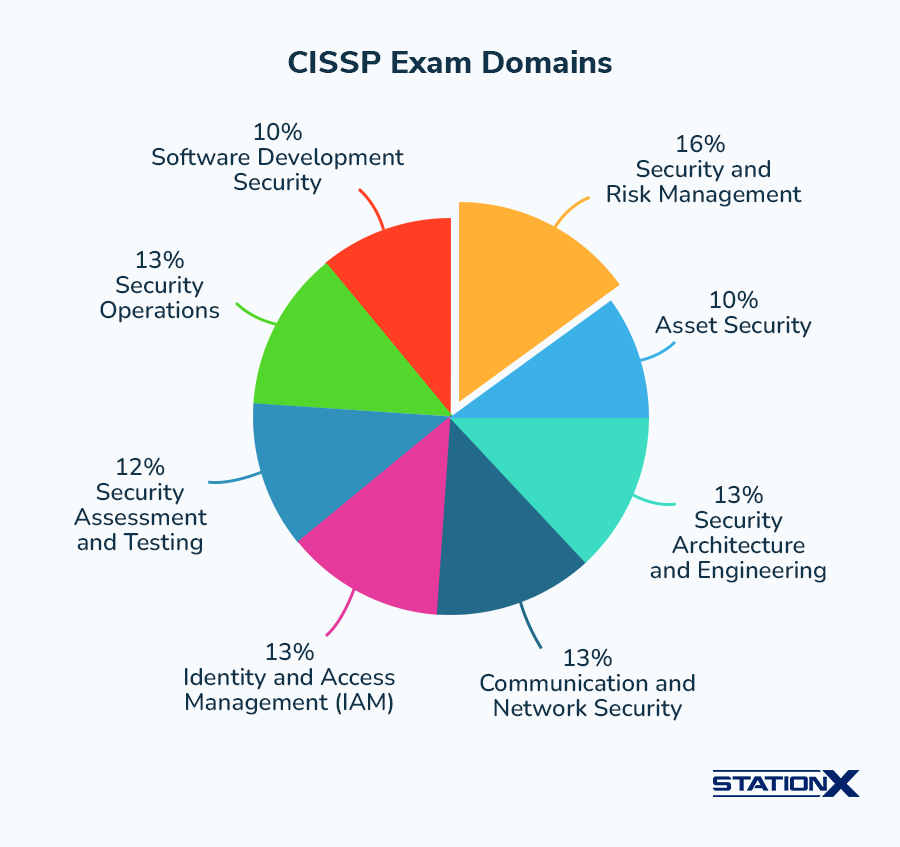
The following table lists the CISSP exam domains:
| Domains | % of exam |
| 1. Security and Risk Management | 16% |
| 2. Asset Security | 10% |
| 3. Security Architecture and Engineering | 13% |
| 4. Communication and Network Security | 13% |
| 5. Identity and Access Management (IAM) | 13% |
| 6. Security Assessment and Testing | 12% |
| 7. Security Operations | 13% |
| 8. Software Development Security | 10% |
The CISSP exam emphasizes a managerial and strategic approach to security rather than purely technical problem-solving. You must think like a CISO, manager, or consultant, focusing on efficiency, cost, compliance, and long-term scalability rather than hands-on engineering, as emphasized in SecurityX.
Winner: CISSP
Due to its extensive knowledge domain coverage and ability to push students to perform at an exceptionally high level, the CISSP emerges as the top choice for exam quality. In contrast, SecurityX has less comprehensive knowledge coverage, and the rebranding makes it appear less impressive.
Eligibility Requirements
Both globally recognized certifications have prerequisites; they cater to experienced information security professionals with a minimum of five years of experience, offering a pathway to enhance skills in network security, risk management, threat analysis, and security programs.
SecurityX Prerequisites
CompTIA doesn’t mandate prerequisites, but recommends that you have at least ten years of general IT experience, with at least five years of hands-on security implementation experience. No, you don’t have to have accumulated such expertise. Still, it’s vital to familiarize yourself with the syllabus and have hands-on experience that can help you with the exam questions.
CompTIA suggests that candidates acquire the knowledge required to pass the Network+, Security+, CySA+, Cloud+, and PenTest+ certifications, or their equivalent. Even with these certifications to your name, real-world experience would undoubtedly make a significant difference in your success.
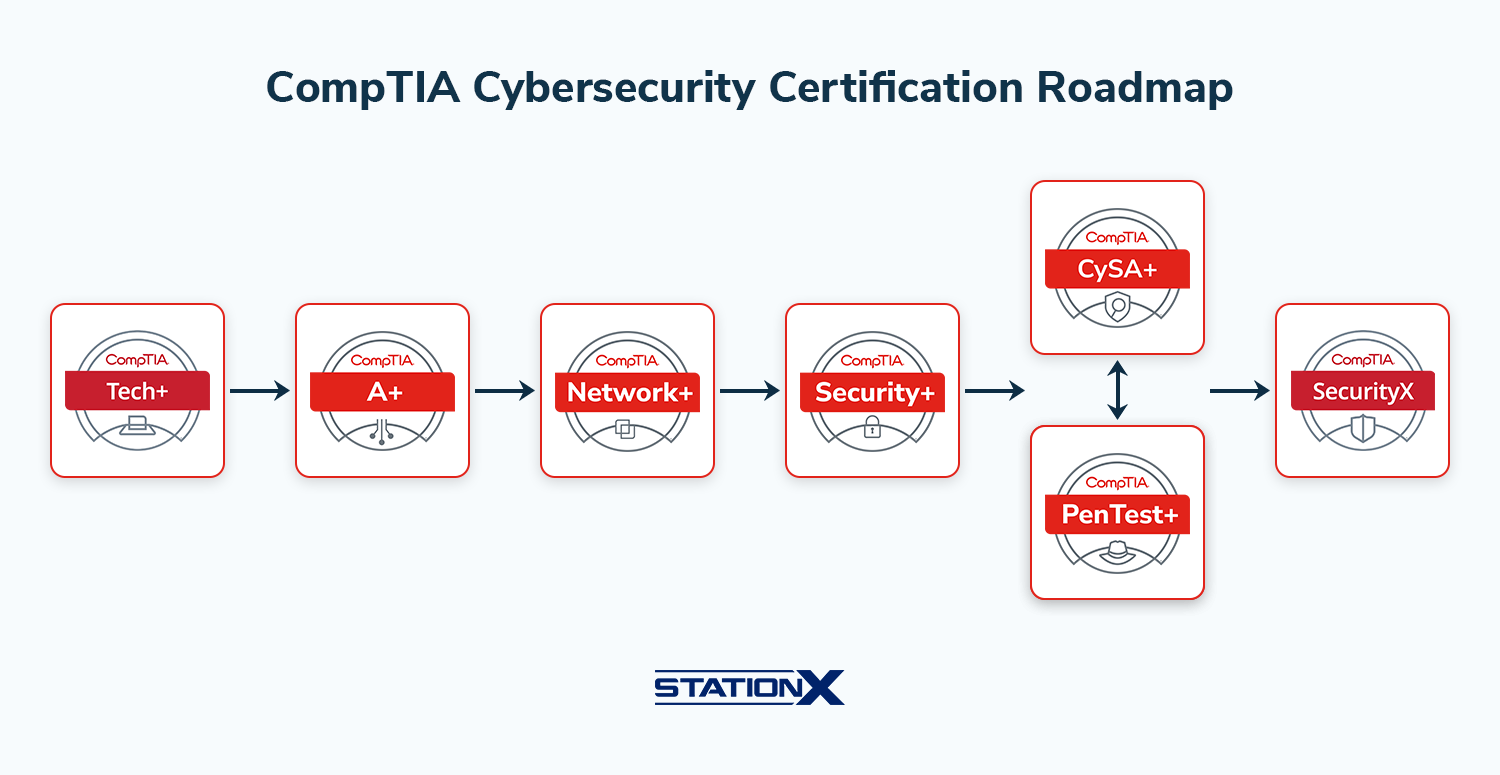
You can find more information on how CompTIA certifications build upon each other in our companion article CompTIA Pathway: Your CompTIA Certifications Roadmap.
Information Security Courses Bundles
Want lifetime access to expert-led cyber security training? Explore our Information Security Course Bundles — one-time purchase packages covering top topics like Ethical Hacking, Cloud, Linux, DevSecOps, and CompTIA certifications.
CISSP Prerequisites
You must have five years of cumulative paid full-time work experience in at least two of the eight domains in the current CISSP exam outline. You may substitute up to one year of such experience with a post-secondary bachelor’s/master’s degree in computer science, information technology (IT), or related fields, or an ISC2-approved credential, such as SecurityX.
If you do not have the required experience, you become an Associate of ISC2 upon passing your CISSP exam. ISC2 then gives you six years to earn the required years of experience before awarding you the full CISSP credential. ISC2 also requires a CISSP in good standing to vouch for your experience before they will award you the title.
You can learn more about CISSP experience requirements and how to account for part-time work and internships.
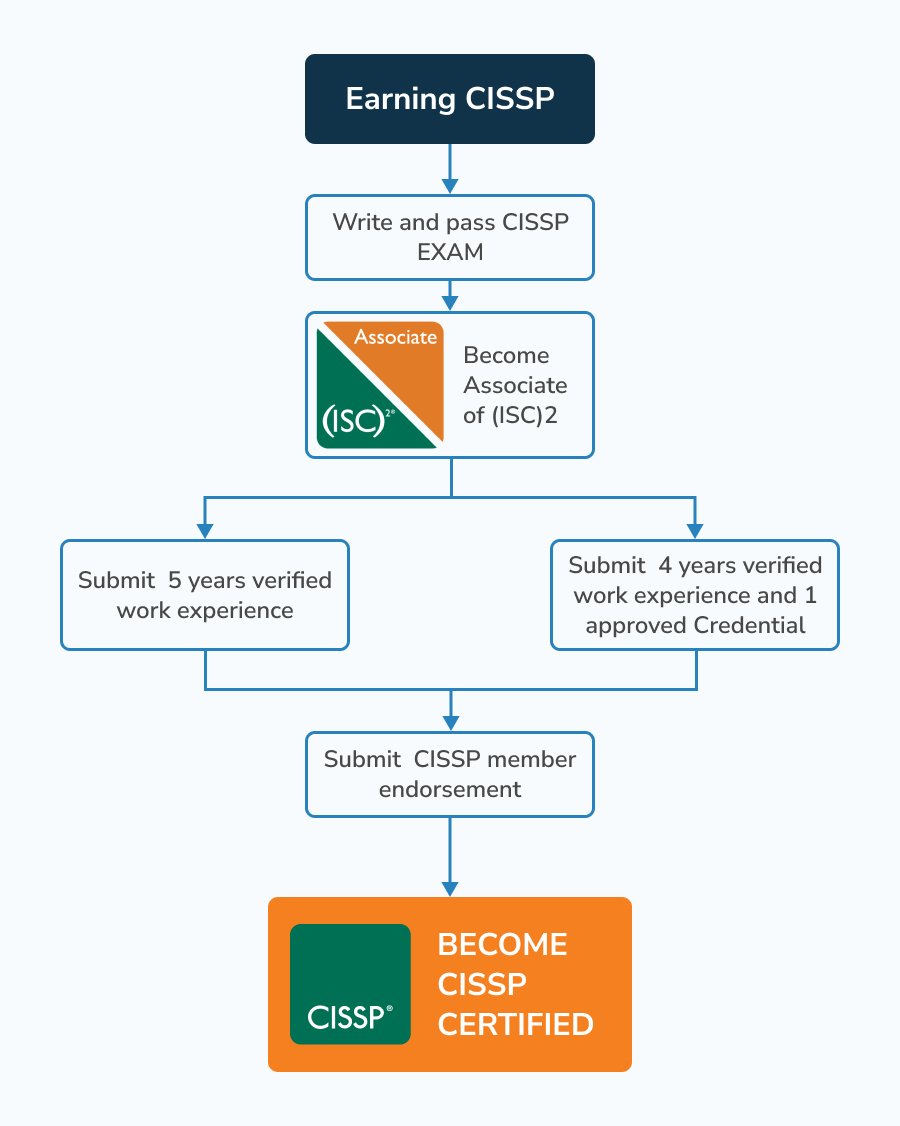
Winner: SecurityX
SecurityX does not require verifiable work experience, while CISSP does. CISSP candidates must also obtain an endorsement from a current CISSP holder. This makes SecurityX easier to sit for and write, especially for those earlier in their careers.
While foundational certifications like CySA+ and PenTest+ can help build the knowledge needed for SecurityX, they are not a substitute for years of real-world security work. Unlike most CompTIA certifications, SecurityX’s advanced technical scope means that hands-on practice, particularly in lab environments and with performance‑based questions, is critical for success.
In contrast, passing the CISSP exam does not guarantee you’ll earn the certification. You must still possess the required work experience in roles that map to ISC2’s security domains and secure an endorsement. While ISC2 allows time to meet these requirements, SecurityX’s lack of strict prerequisites makes it more accessible to sit for.
Exam Difficulty
It’s no joke that both exams demand advanced cybersecurity knowledge, making them top cybersecurity certifications intended for seasoned IT and security professionals. However, assuming you have the time and resources to devote to studying them, which one would be easier to pass? Let’s analyze the difficulty of CISSP vs SecurityX below:
SecurityX Exam Difficulty
An overview of the exam objectives reveals that SecurityX goes into depth on fewer topics than CISSP. SecurityX broadly tests you on highly technical cyber security concepts and applications. Vendor-neutral exams, such as those of CompTIA, often set questions that avoid the nitty-gritty of technical specifications and ensure the correct answers are as widely applicable as possible.
A SecurityX candidate must complete at most 90 questions in a computer-based test lasting 165 minutes (two hours and 45 minutes).
The most significant difference between both exams is that SecurityX allows you to review your answers (with the glaring exception of virtual PBQs). You can mark questions for review and to make further adjustments as long as you have time remaining, even though you won’t earn back the time spent flagging those questions.
CISSP Exam Difficulty
If SecurityX is about how to perform tasks, CISSP would ask you why you should perform them. As the CISSP is a managerial certification that encompasses many aspects of information security, preparing for it may initially present challenges to IT and cyber security professionals who are more technically inclined and have less experience in project management.
A CISSP candidate must complete 100-150 questions on the CAT-powered exam in three hours, or 180 minutes. CAT adjusts the exam content as you go, making it more challenging with each question. As you correctly answer questions, CAT will select more difficult questions from that knowledge domain.
As the questions become more difficult, they also become worth more points. As a result, correctly answering the increasingly complex questions can result in the exam ending earlier with a passing grade.
The CAT evaluates your likelihood of passing starting at question 100. If you’re 95% likely to pass or fail, the exam ends; otherwise, it continues until it can make a determination or you reach question 150.
CISSP has always been a difficult exam, but CAT takes it up a notch and challenges you with harder questions once it identifies a domain you know well. If that’s not difficult enough, your answer on every CISSP question is final. You can’t undo or rethink your answers because every answer you provide influences subsequent questions in the CAT.
Winner: SecurityX
The ease of question review, a relatively shorter exam length, a lower average number of questions you must complete per hour, and the narrower focus on technical aspects of cyber security management make SecurityX easier to prepare for and pass than the CISSP.
Job Opportunities
It doesn’t take long to find out that cyber security job postings almost always include CISSP as a requirement or as a “nice-to-have” for prospective applicants. By comparison, SecurityX’s forerunner, CASP+, has hardly been popular, and the rebranded name has yet to appear in job descriptions.
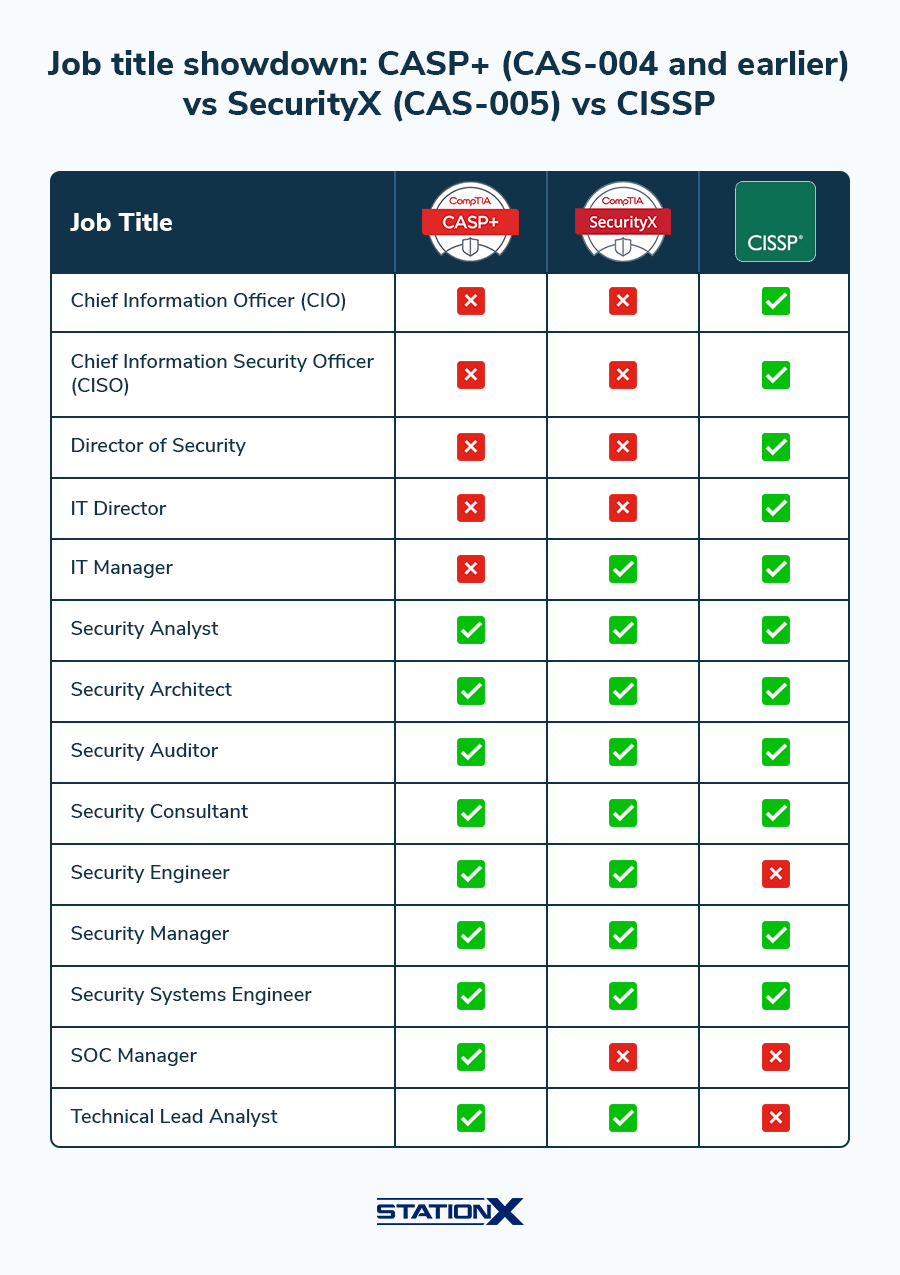
SecurityX Job Opportunities
SecurityX job titles largely overlap with those of CASP+, with the exception of those listed in the table above.
The CompTIA page on SecurityX further states that the certification prepares you for the following NICE and DoD 8140 work roles (not an exhaustive list):
- Security Architect
- Systems Requirements Planner
- Security Control Assessor
- Research and Development Specialist
Here are some job descriptions mentioning SecurityX/CASP+. Note that Glassdoor only has 589 entries, while Indeed has 650+ for SecurityX and CASP+ combined:
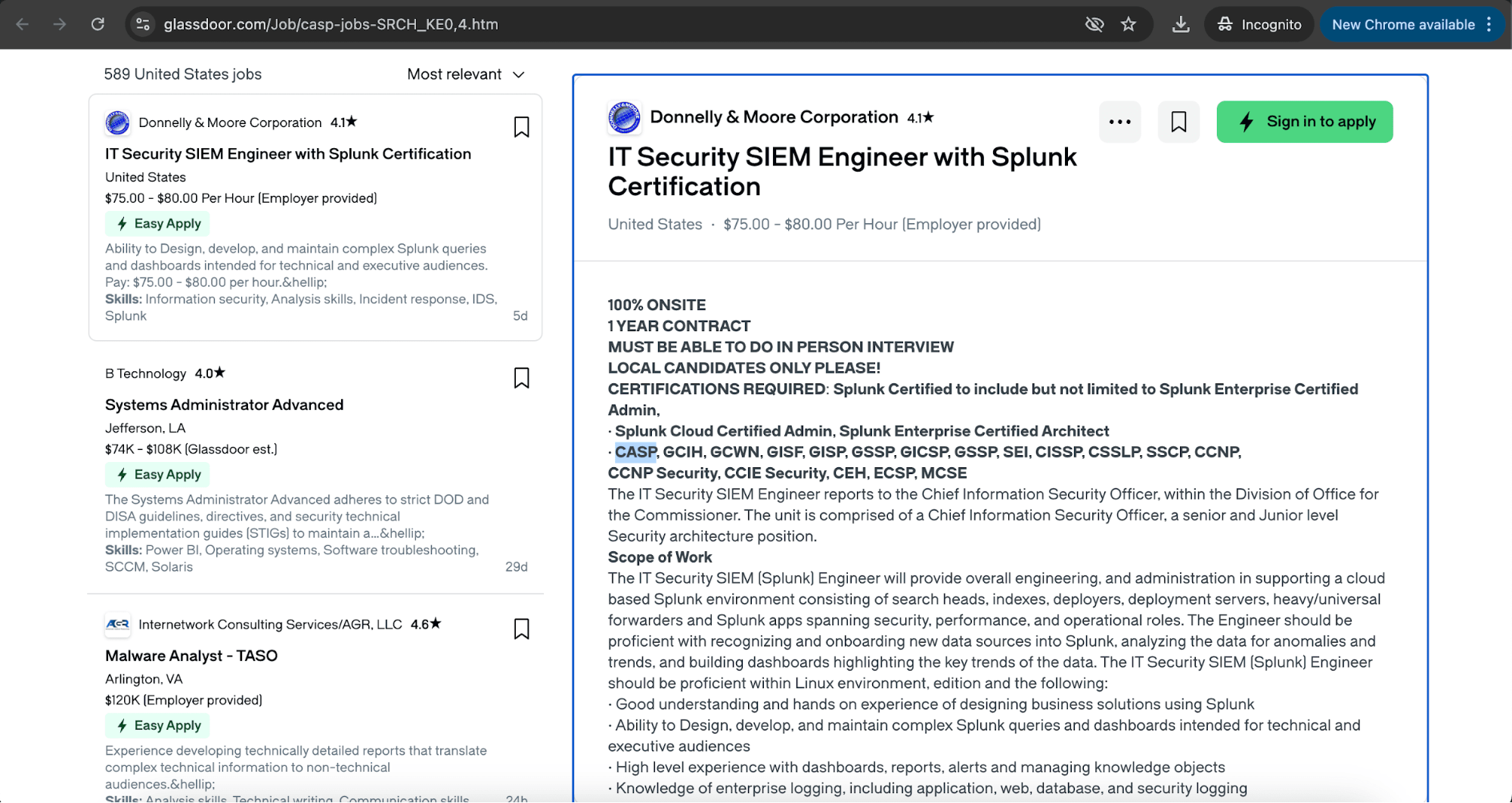
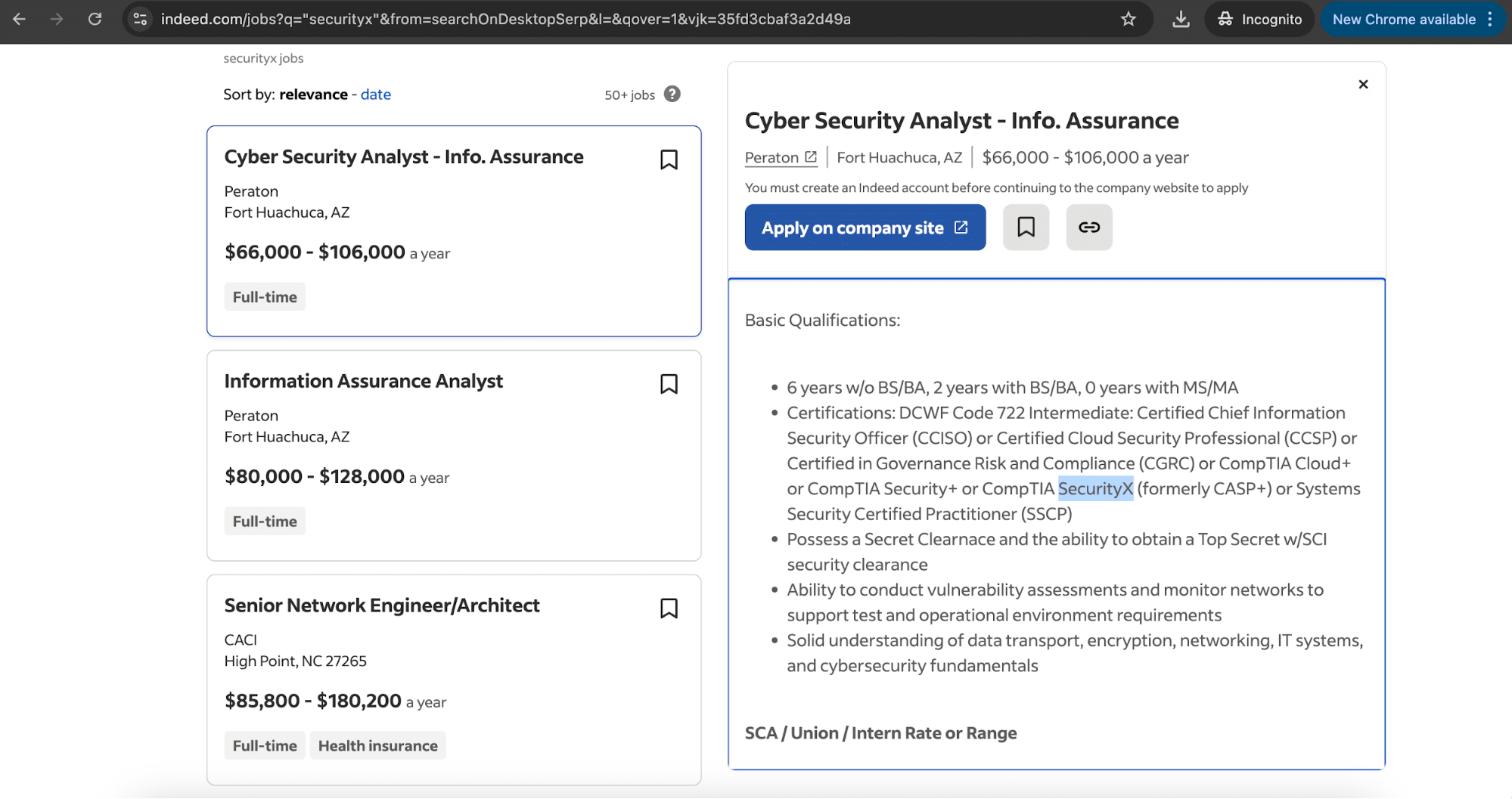
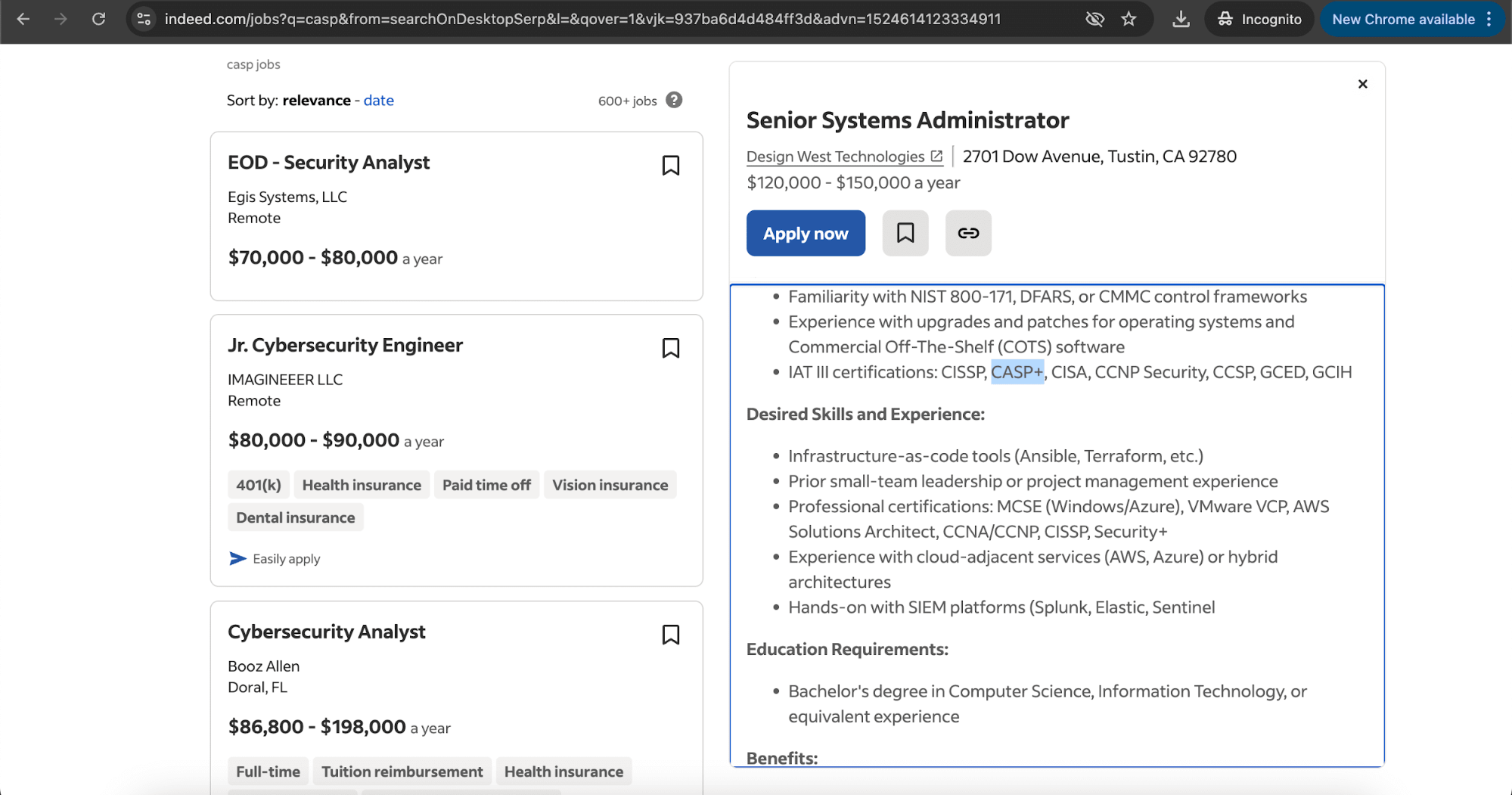
Here’s the latest salary breakdown of SecurityX jobs according to InfoSec:
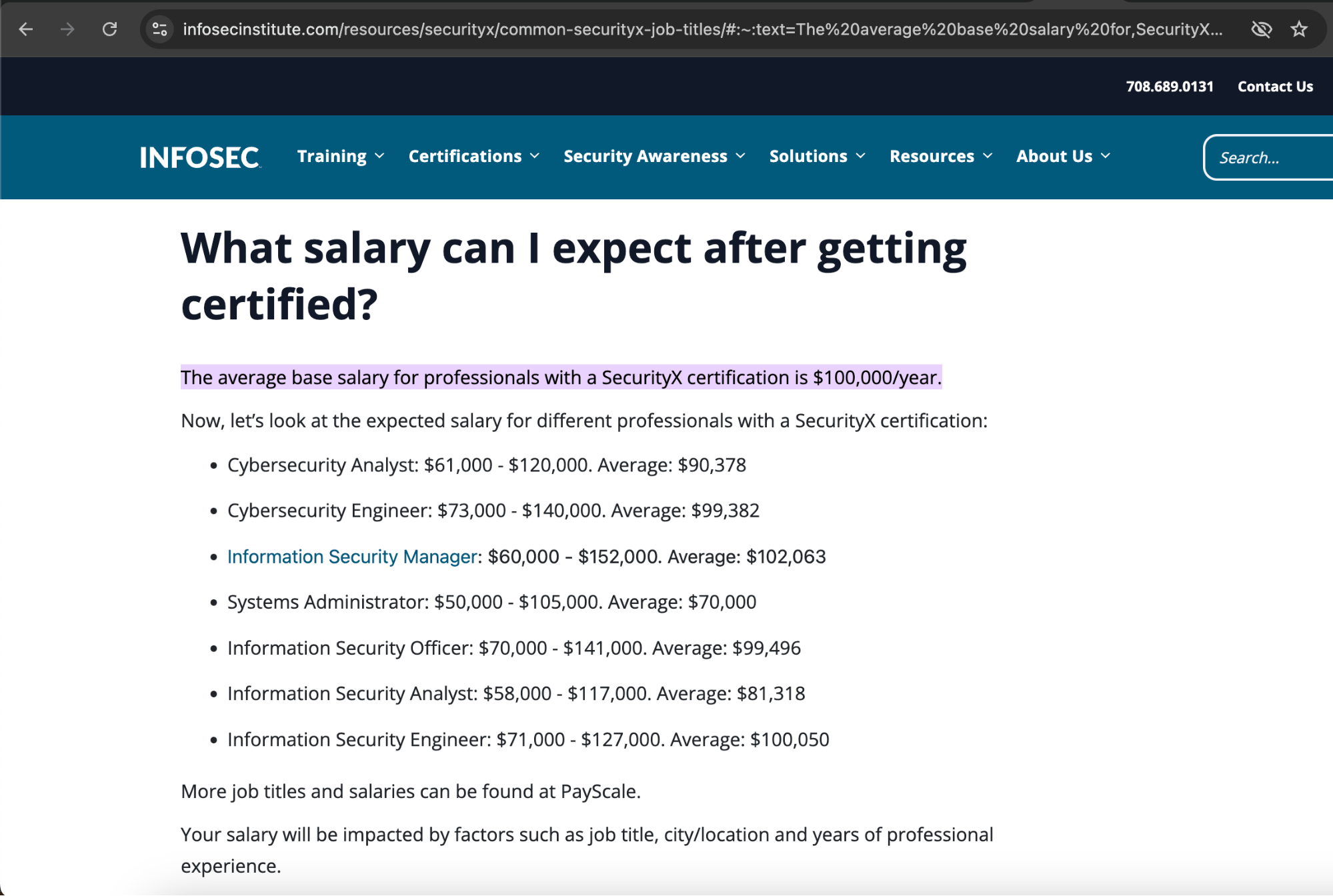
We found limited information on SecurityX salaries on PayScale, so we sought out CASP+ instead:
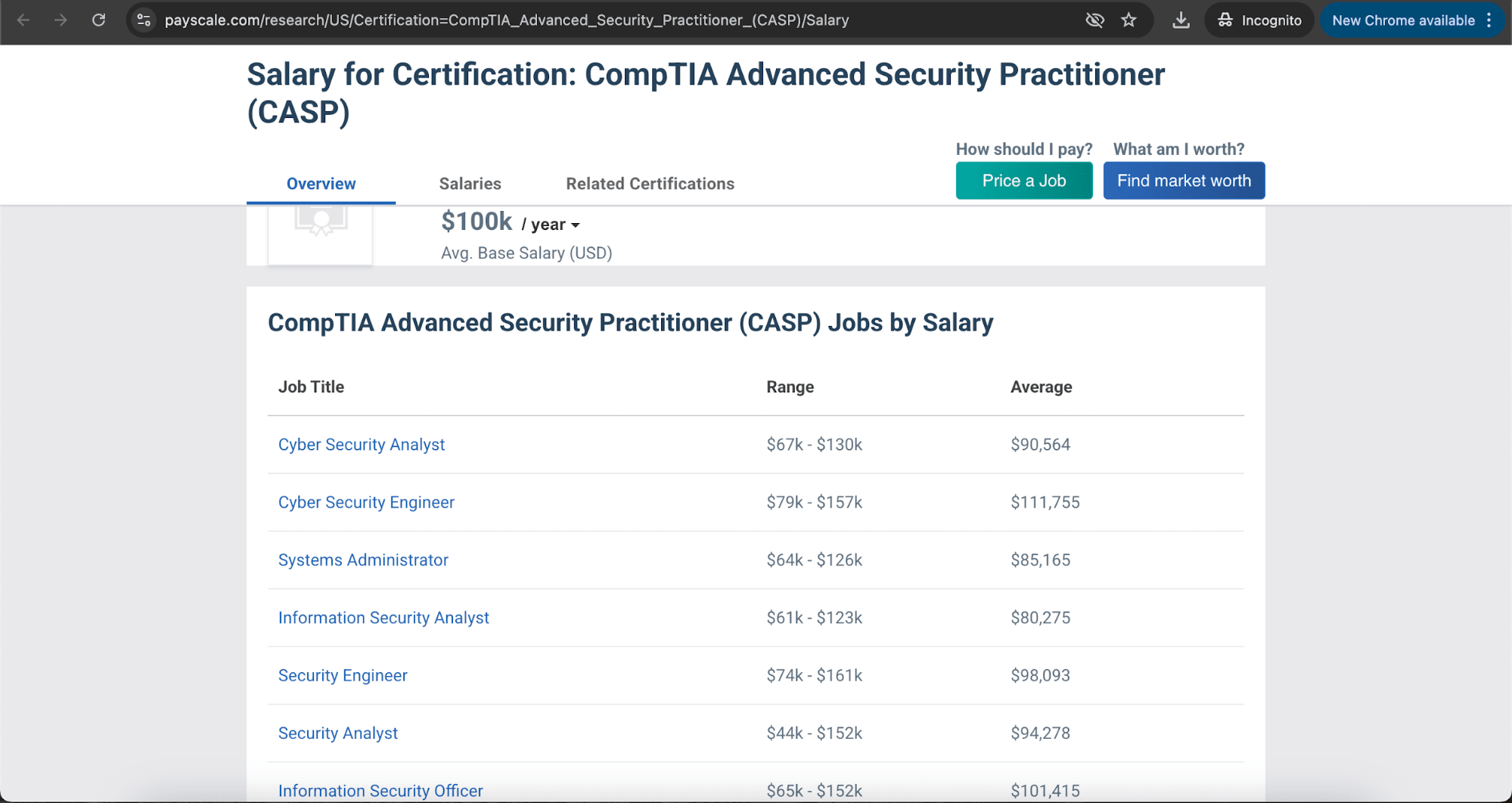
CISSP Job Opportunities
CISSP targets seasoned security practitioners, managers, and executives who want to demonstrate their expertise in a broad range of security techniques and principles. Typical CISSP job titles include:
- Chief Information Security Officer (CISO)
- Chief Information Officer (CIO)
- Director of Security
- IT Director/Manager
- Security Analyst
- Security Manager
- Security Auditor
- Security Architect
- Security Consultant
Here’s a sample of job descriptions mentioning CISSP. Notice the number of CISSP jobs is 10,000+ on Indeed, 9,824 on Glassdoor, and 418 on CyberSecurityJobs:
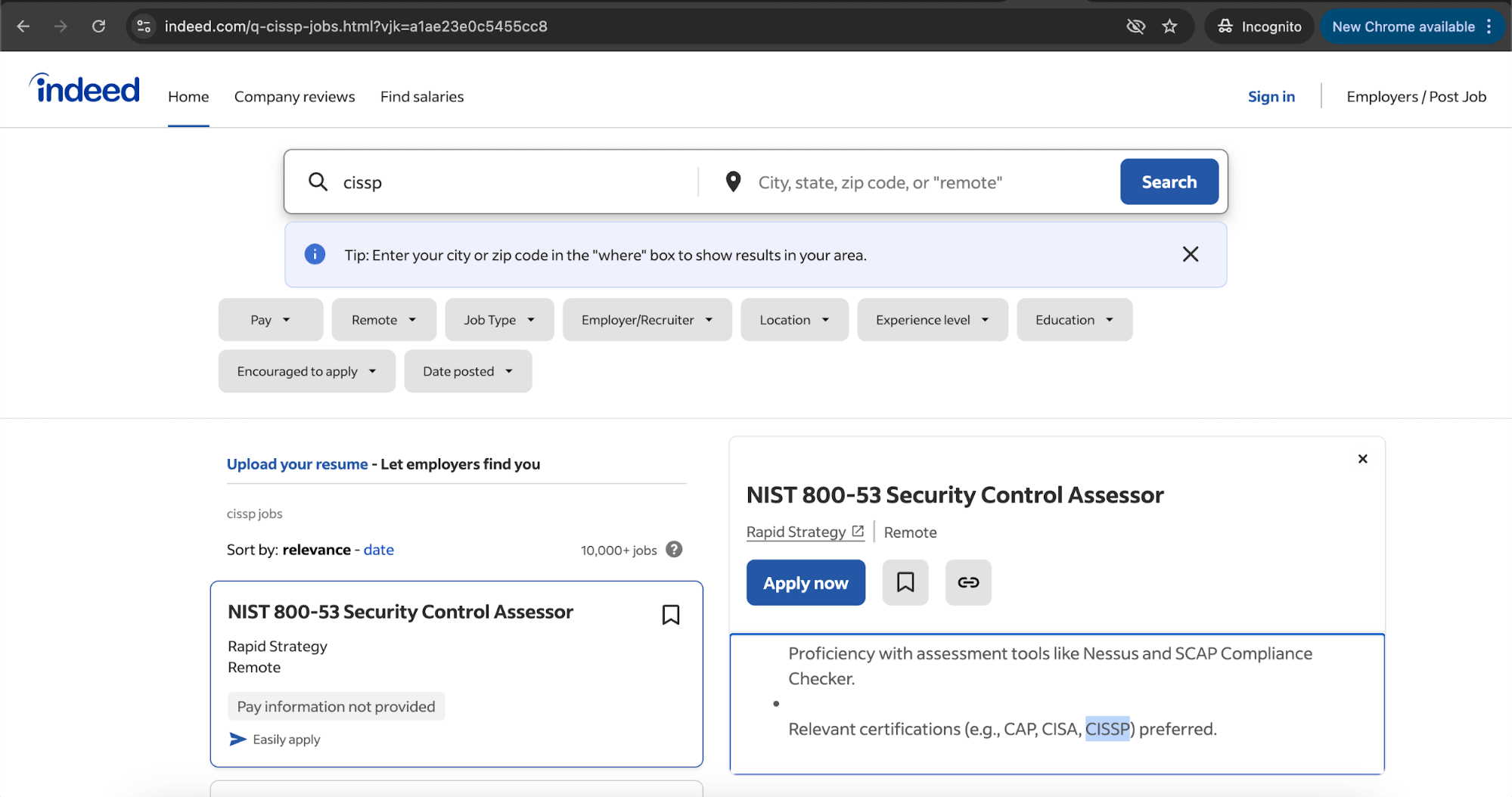
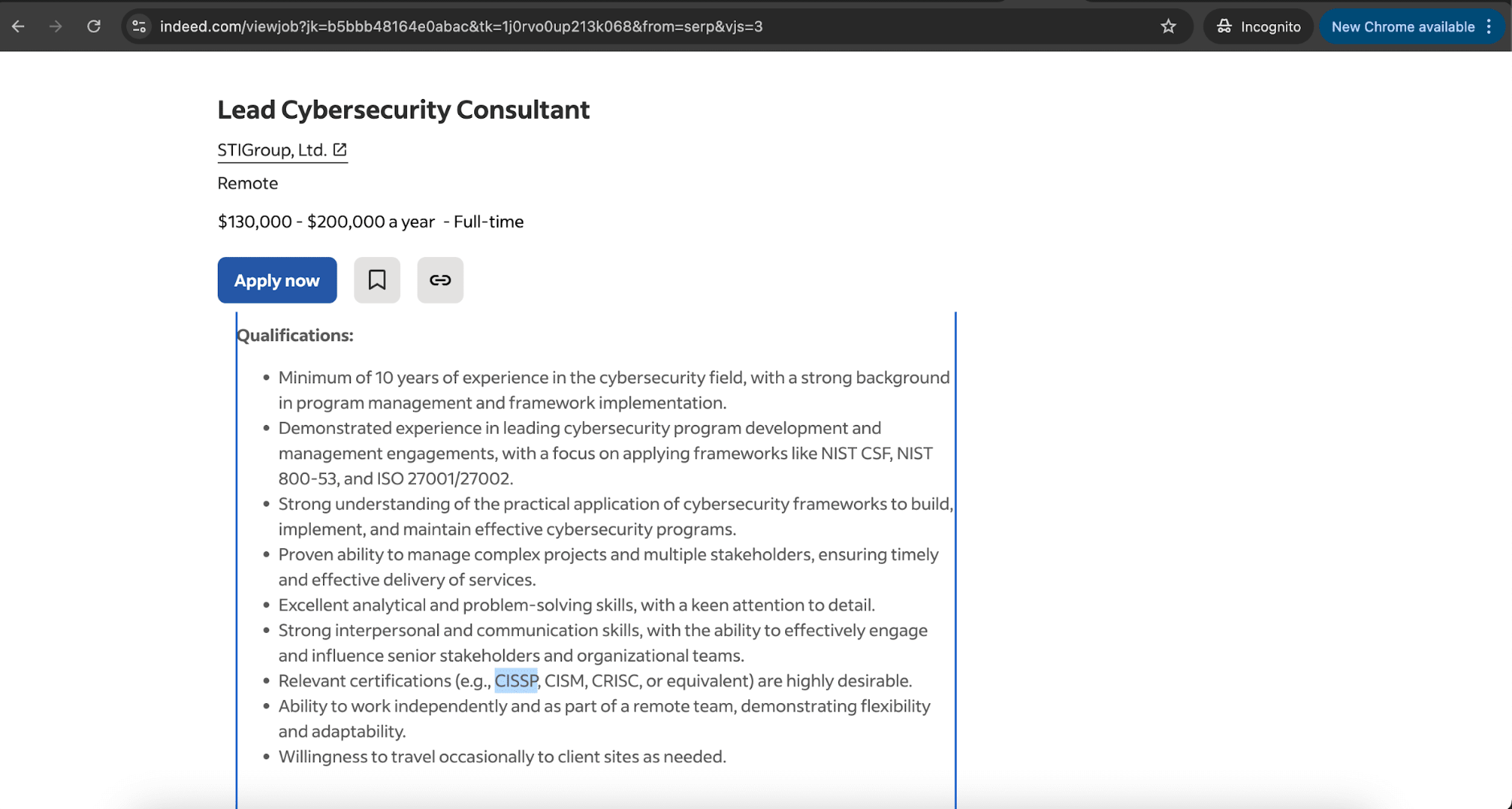
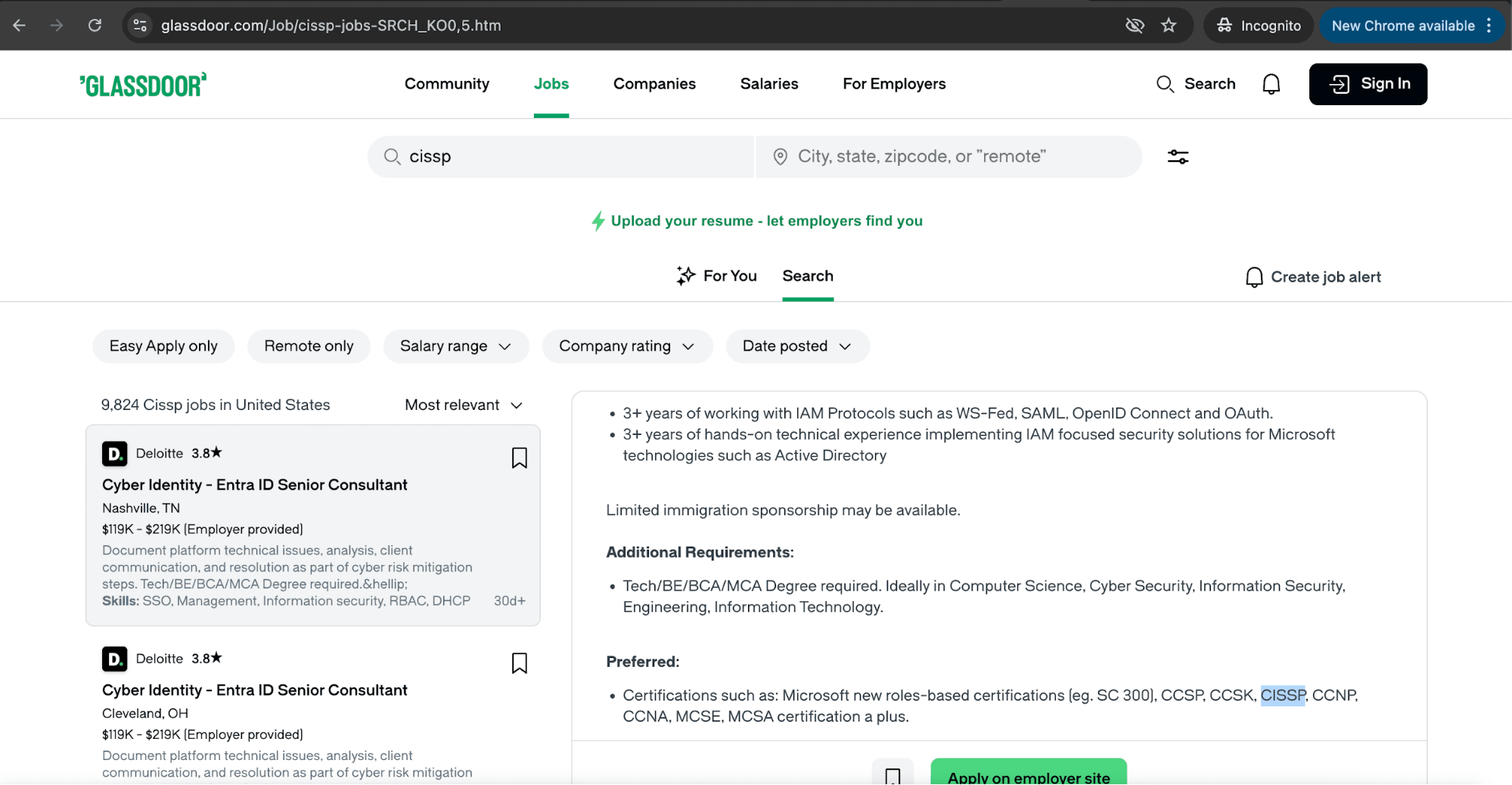
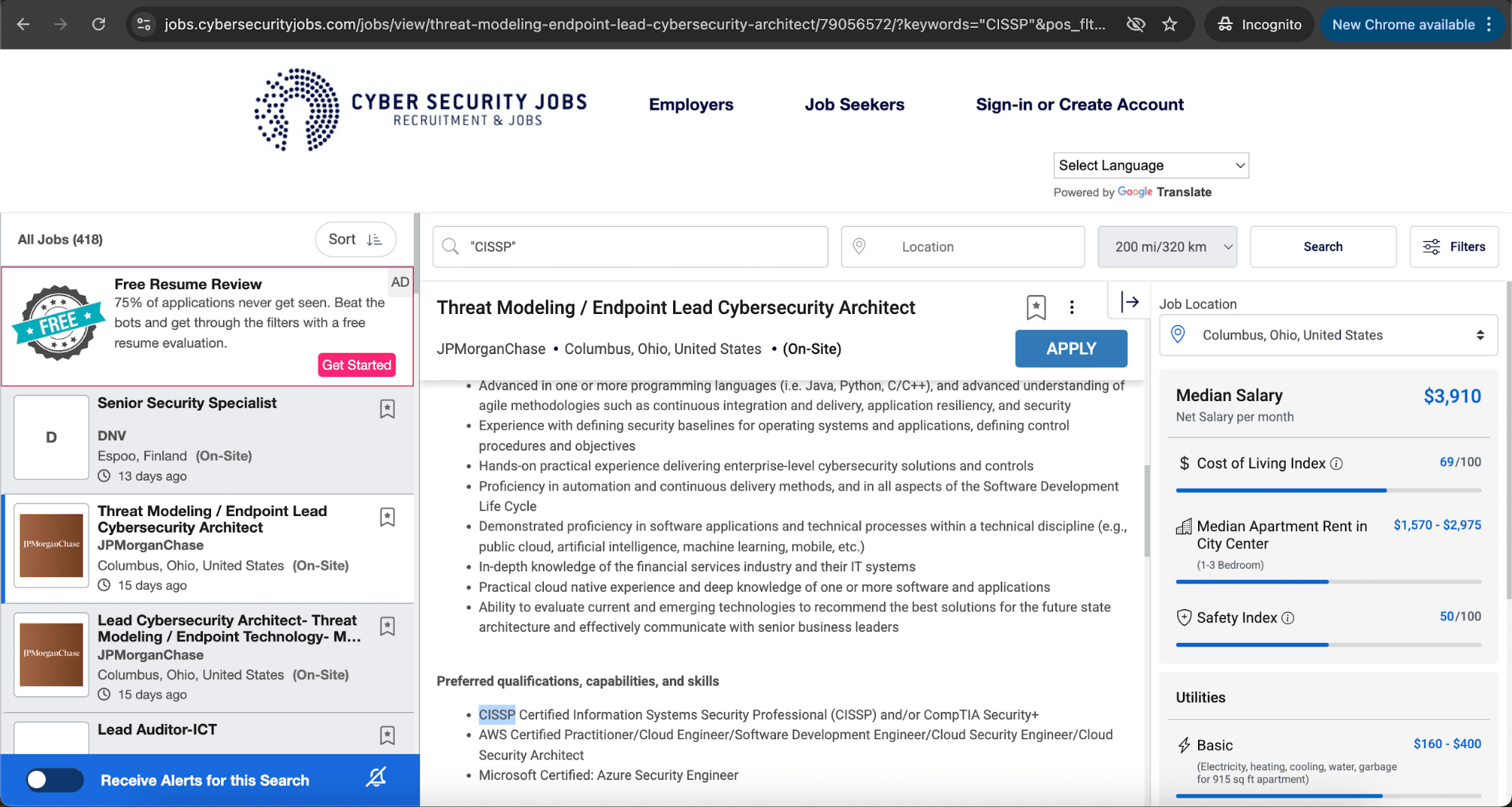
CyberSecurityJobs has a special page for CISSP jobs:
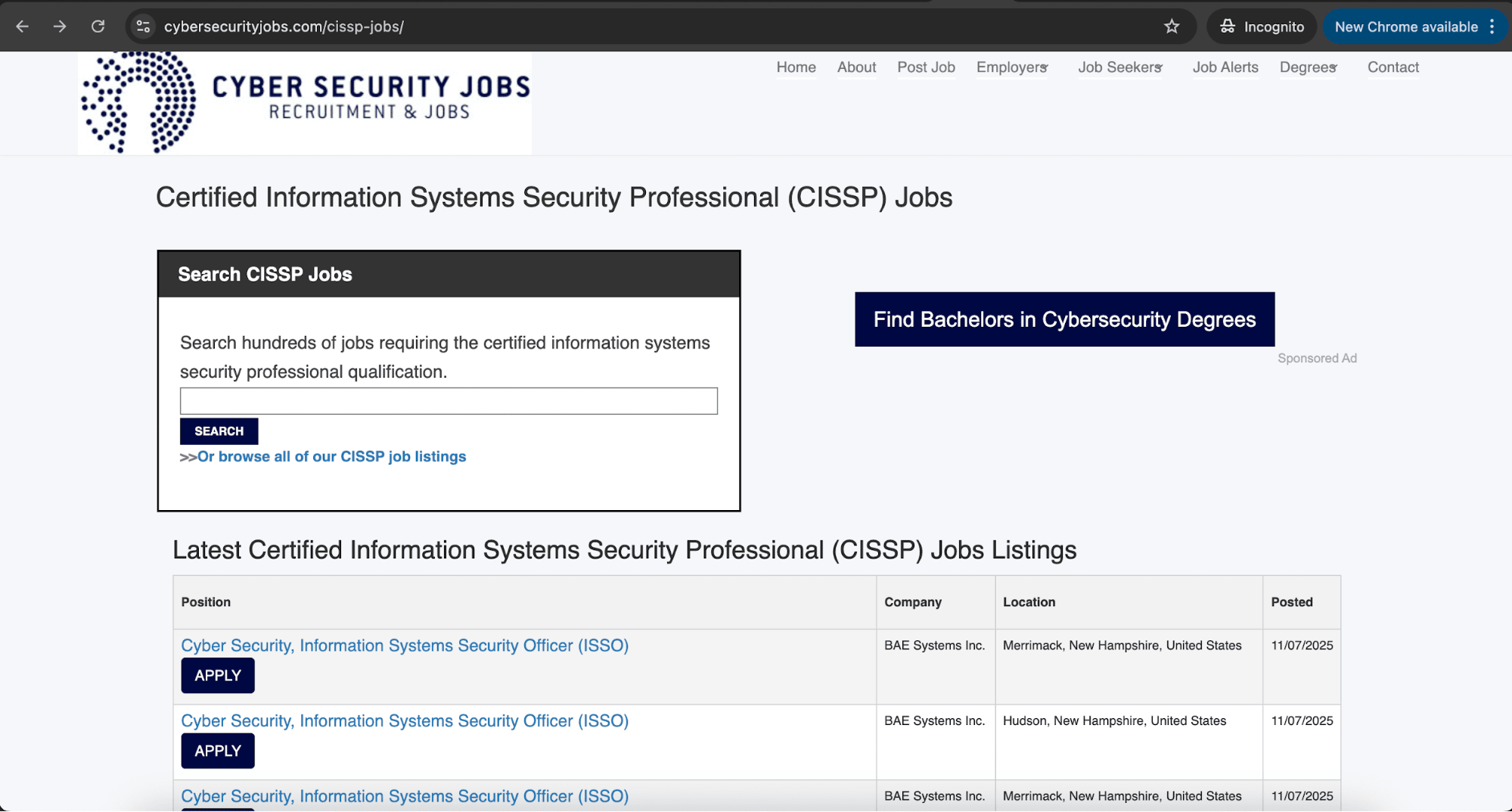
Let’s click on one of these listings:
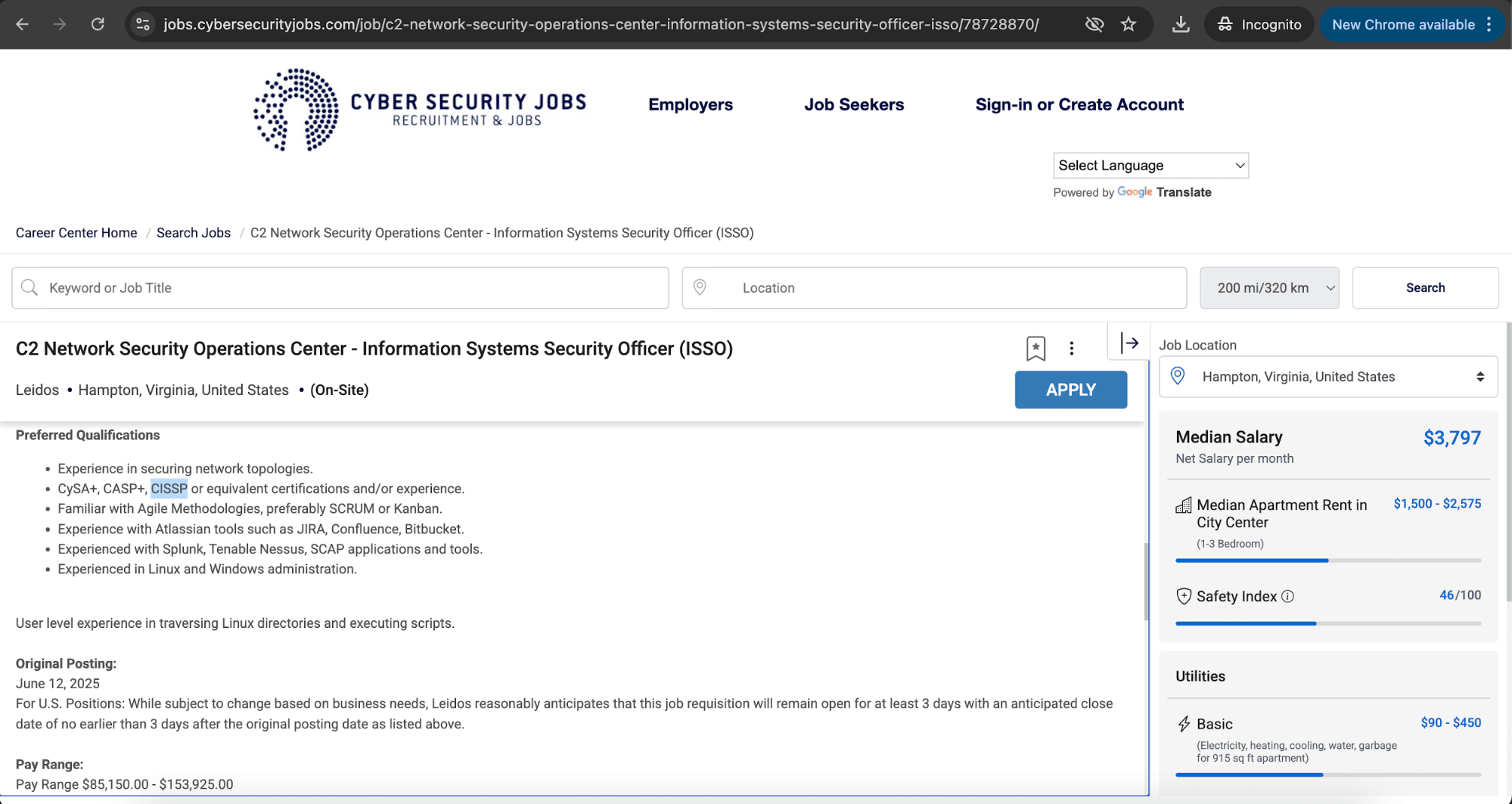
So many CISSP jobs exist. Here are the latest salaries of CISSP jobs:
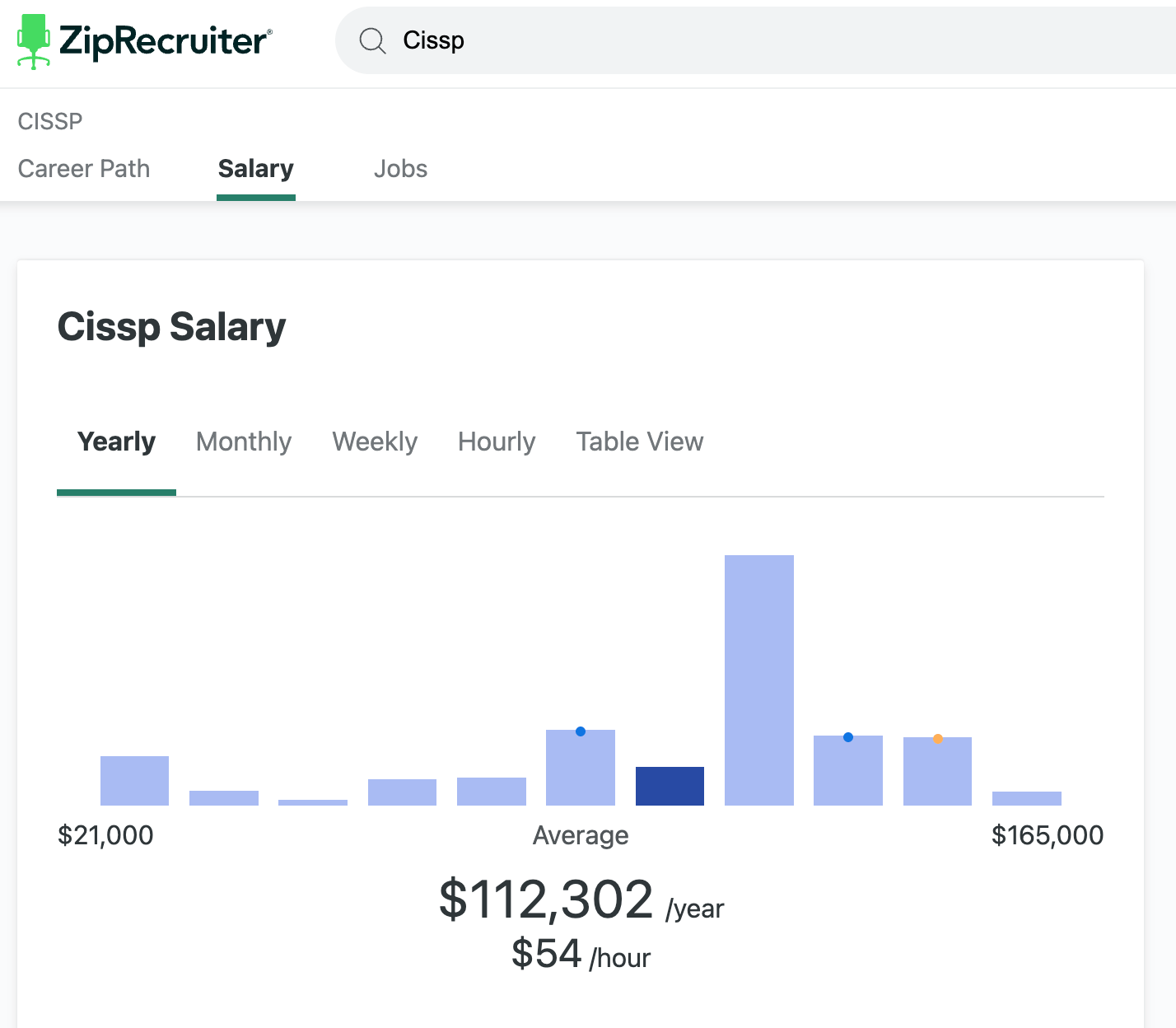
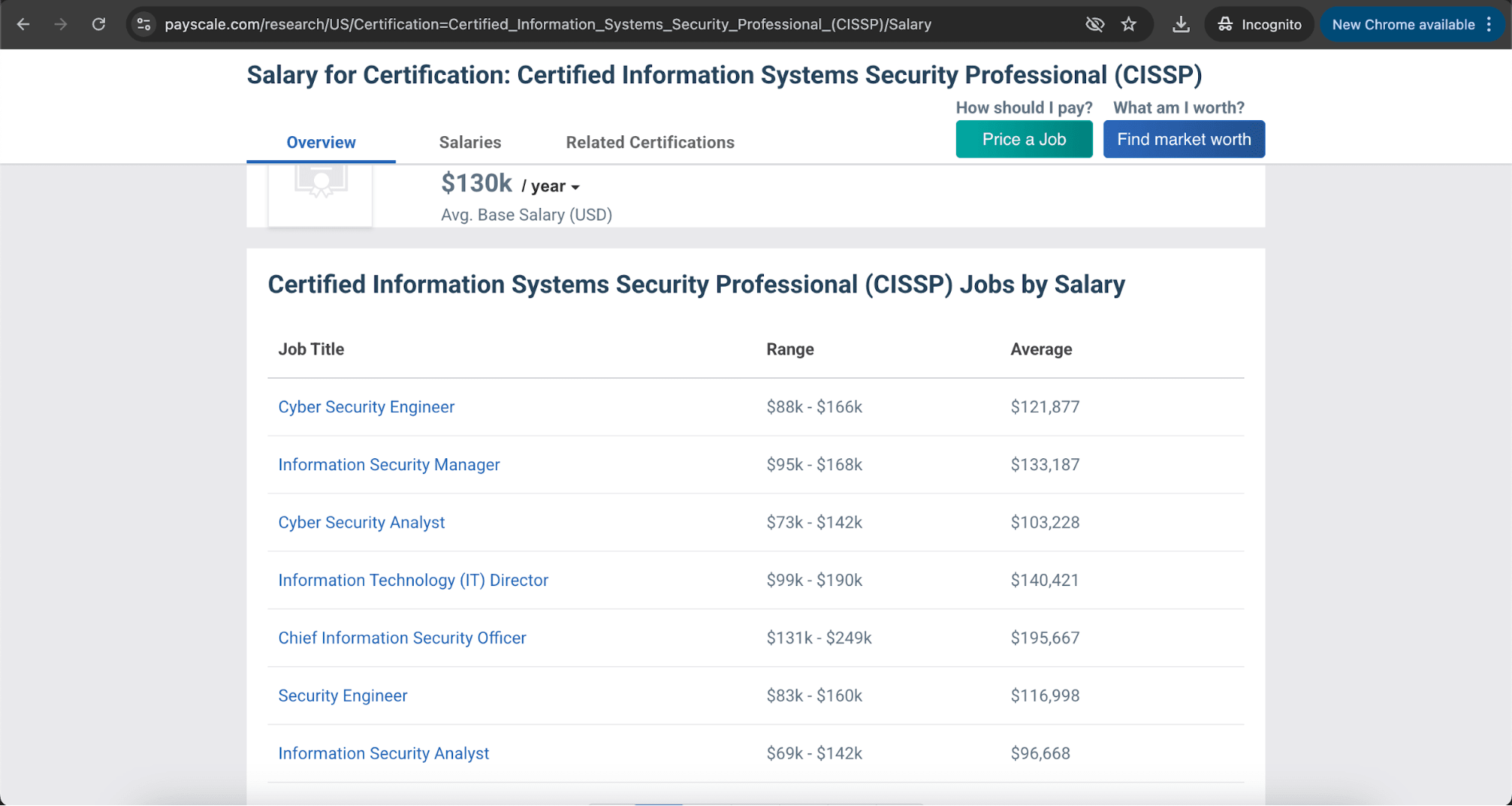
Winner: CISSP
A CISSP makes you a strong candidate for higher-level career opportunities, and such jobs typically pay better than those in SecurityX.
Thanks to its extensive managerial coverage, CISSP prepares you specifically for the in-demand and high-paying CISO role. In contrast, SecurityX sets candidates up for roles that would not be considered C-Suite, such as security architect and senior security engineer.
Furthermore, thanks to the rebranding, we expect it’ll take some time before recruiters update cyber security job descriptions to indicate which jobs are looking for SecurityX holders.
Cost and Recertification
The dynamic and ever-evolving nature of cyber security makes it essential for certification exams to remain current. Cyber security professionals must stay on top of their game to demonstrate their competence in the field. Thus, each certification must expire unless its holder demonstrates documented progress in the field of cyber security.
CompTIA and ISC2 have continuing education systems to help credentialed individuals participate in activities related to advancing their profession in cyber security, such as taking other security-related courses, earning certifications, speaking at conferences, publishing, or attending industry events.
CompTIA Voucher Hub
Planning your next CompTIA exam? Save up to 30% with our CompTIA Voucher Hub — official partner discounts for all CompTIA certifications, including Security+, Network+, A+, and more.
SecurityX Cost and Recertification
The cost of taking the SecurityX exam is $529 USD. It’s valid for three years. You renew it in those three years by earning 75 continuing education units (CEUs) in CompTIA.
You’ll pay a renewal fee of $150 USD for the three years unless you:
- pass the latest release of your CompTIA exam,
- earn a higher-level CompTIA certification, or
- complete CompTIA’s CertMaster CE program.
SecurityX is the highest level of CompTIA’s cyber security certification path, so CompTIA allows you to renew it with non-CompTIA certifications worth 75 CEUs, allowing you to renew your SecurityX with a single exam. This list includes (among others):
Cisco
- CCIE Security
- CCNP Security
EC-Council
- LPT - Licensed Penetration Tester (Master)
- CCISO - Chief Information Security Officer
GIAC
- GSOM: GIAC Security Operations Manager
ISACA
- Certified Information Systems Auditor (CISA)
- Certified Information Security Manager (CISM)
ISC2
- CISSP - Certified Information Systems Security Professional
Hence, the price of acquisition and first renewal of your SecurityX certification is a minimum of $679 USD altogether.
CISSP Cost and Recertification
The cost of taking the CISSP exam is $749 USD. Once you’re officially CISSP-credentialed, the CISSP certification is also valid for three years, during which you can only renew it by earning a total of 120 continuing professional education credits (CPEs) in CompTIA.
Additionally, a CISSP holder must pay an annual maintenance fee of $135 USD, unless you pass the CISSP exam without the required four to five years of experience and instead pay $50 USD every year in the next six years or less as a new Associate of ISC2.
As a result, you should set aside a minimum of $799-884 USD for obtaining and first-time renewing your CISSP certification, depending on whether you pass it without or with the required work experience.
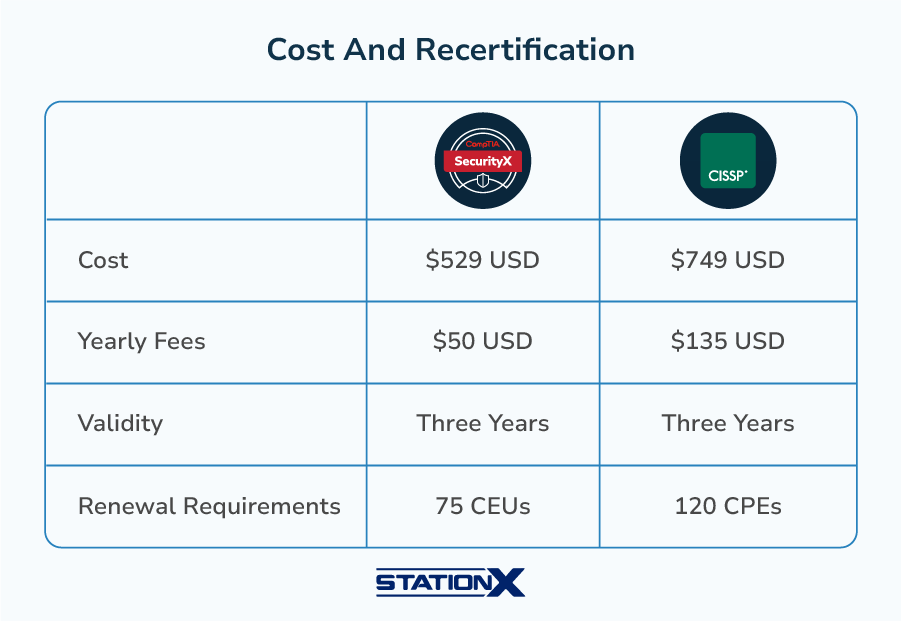
Winner: SecurityX
CompTIA has made SecurityX a more affordable exam to take and an easier certification to renew. Moreover, it doesn’t subject its members to high yearly maintenance fees like ISC2.
Furthermore, if you pass the SecurityX exam without having first gained any relevant work experience, you have no obligation to earn them in the years to come, unlike for CISSP.
SecurityX vs CISSP: Which One’s Better?
Despite the cost, fees, and requirements, the CISSP is our preferred certification. Here’s a table summarizing our CompTIA SecurityX vs CISSP comparison:
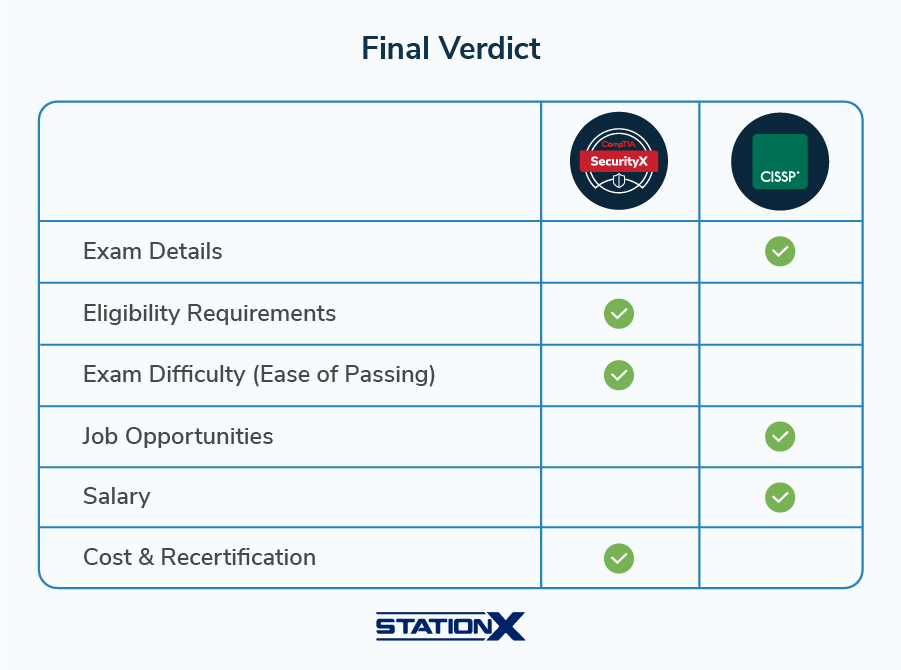
Although both certifications can be fantastic resume builders and professional knowledge enhancers, the CISSP certification wins hands down, offering a higher return on investment due to its higher earnings potential.
Not only does CISSP enjoy greater recognition in the cyber security industry, but it also helps you build a more extensive network of ISC2-certified professionals, boasts higher salary prospects, and expands massively on the volume of job advertisements you can apply for.
Further complicating the available information on SecurityX (as CASP+ rebranded) is the plethora of web search results pointing to a more fundamental CompTIA certification, Security+, instead of SecurityX, because “Security+” and “SecurityX” differ by only one character, confusing search engines and generative AI agents as of writing.
All in all, although there’s no harm in pursuing either certification, the CISSP certification can provide a significant boost to your career. However, if you have sufficient resources to earn both certifications, we recommend pursuing SecurityX first and then CISSP afterwards. Holding both will grant you an impressive resume, and there is value in achieving both.
Acquiring your SecurityX certification will prepare you somewhat for the CISSP exam, making it much easier as a result, thanks to overlapping exam content and SecurityX being an ISC2-approved certification, which reduces the years of work experience required for CISSP credentialing. The CISSP, in turn, will help you renew SecurityX for another three years.
Preparing for either or both? Join the StationX Master’s Program for access to over 30,000 courses and labs, covering everything you need for a career in IT, Network Administration, Cyber Security, and beyond. See some of our courses below.
Also, if you are interested in earning your SecurityX certification, we offer tremendous voucher discounts (up to 30%) as an authorized CompTIA partner. See our voucher page for details.
You can find these CISSP Training Courses here:
- CISSP Boot Camp: Domains 1 and 2
- CISSP Boot Camp: Domains 3 and 4
- CISSP Boot Camp: Domains 5 and 6
- CISSP Boot Camp: Domains 7 and 8
